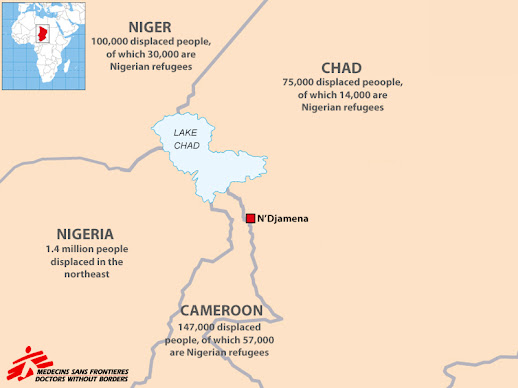Hydropolitics in the Lake Chad and the Premise of a Regional Security Complex for Peace
Hi guys! This week’s post will examine the hydropolitics of the Lake Chad and the premise of peace from a regional security cooperation.
The Lake Chad Basin and its large wetlands, aquifers and groundwater is essential to the four riparian sates, as well as Algeria, Central African Republic, Libya and Sudan. Consequently, peacefully sharing such resources in the current complex unstable context of the lake is a challenge to regional security (Asah, 2015/Ani, Jungudo, Ojakorotu, 2018). Hydropolitics have thus been the focus of development programmes, claiming the need for a regional approach on security in the Lake Chad Basin (Ani, Jungudo, Ojakorotu, 2018). Intrastate cooperation has been fostered by the 2015 redefinition of the Multinational Joint Task Force (MNJTF) as a collective security scheme driven by the state-members of the Lake Chad Basin Commission (LCBC) under the recognition of Boko Haram as a regional crisis (Albert, 2017). The MNJTF military operations have been articulated in the premise of trade expansion, hydro-energy initiatives, humanitarian relief, efficient water management and peace in the region (Ani, Jungudo, Ojakorotu, 2018).
Various political tools have been used for the creation of the regional security complex in the Lake Chad Basin. First, enhanced support from the African Union has been requested with, for instance, the provision of funds and assistance from the EU for regional cooperation in the basin (Ani, Jungudo, Ojakorotu, 2018). Moreover, the implementation of NGOs such as the UN, WWF or the World Bank in the Lake Chad’s political landscape has increased the amount of (financial) efforts for the regional security initiative (Iocchi, 2020/Asah, 2015). Finally, Nigeria’s heavy reliance on the Lake Chad resource for economic interests and broader national development has raised the regional security complex as a critical political matter for its government (Asah, 2015). Nigeria is considered as a ‘pivotal riparian state’ as it is the source of half of the LCBC’s budget, counts three times more people than in the rest of the basin and benefits from an important military force (Asah, 2015). The country’s high dependency on large-scale irrigation schemes have also pushed for a greater contribution from its neighbours by, notably, using discourses of victimisation as a political instrument (Asah, 2015).
However, the premise of peace under the LCBC’s security paradigm is deeply challenged by both internal and external issues, threatening its sustainability. As I previously mentioned, the lack of trust, sometimes heightened by the language barrier and the differential economic, political or social development among the riparian states, is highly problematic, as it can strongly impact one state’s inclination to participate in the regional operations (Albert, 2017/Asah, 2015). An important internal challenge to military cooperation is the tensed relationship between Nigeria and Chad, especially since the battle of Kinsara in 1983 for control over islands in the Lake Chad Basin (Ani, Jungudo, Ojakorotu, 2018). Finally, concerns about Africa becoming the ‘new jihadist battleground’ raises questions on the disastrous effects that Boko Haram and the Islamic State could have on the regional security regime (BBC, 2020). As Albert fairly highlights, the long-term solution to terrorism in the region is to expect and prepare for future problems while addressing the Boko Haram crisis (2017).
An obvious focus should be set on the political stability and the economic development of the Lake Chad Basin (BBC, 2020). It seems to me that the first step to take in this direction would be to expand, update and redefine the available data on the Lake Chad’s climate, hydrology, biodiversity, population, economic activities among other examples. Although intrastate cooperation has been difficult between the LCBC member-states, the regional concern of the jihadist activities around the lake pushes them to work together. The current sharing of information between the riparian states is already a good start. Indeed, competent monitoring and evaluation would be highly beneficial for accurate impact-assessment modelling processes countering the uncertain context of the region. One could then advocate in favour of an integrated river basin and water management as a series of measures designed to tackle the data-based deficiencies of the more traditional military approach of the MNJTF. Promising projects already exist such as the UNESCO’s project of peaceful and sustainable resources management, named BIOPALT, under the Potential Conflict to Cooperation Potential approach (The Guardian, 2019/UNESCO, accessed in 2020).
Thank you for reading!



This was a great read. I was wondering whether these regional security initiatives have created tangible progress in the securitisation of the Lake Chad Basin? Specifically, has the establishment of the Multinational Joint Task Force helped to promote peace?
ReplyDeleteHi Izzi, thank you for your questions. For now, and in the light of recent events, the securitisation of the Lake Chad region is rather weak and the MJTF's efforts are struggling to achieve successful results, but this has strongly reinforced regional cooperation at all levels which, per se, is a great first step towards the premise of peace in the basin.
Delete